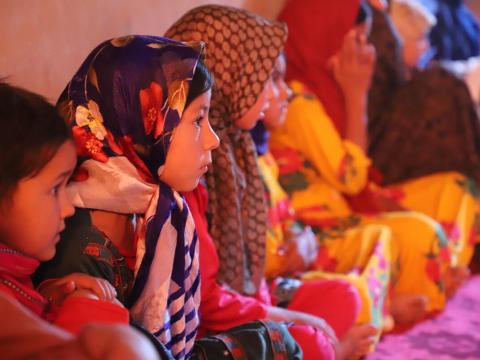Why turning our backs on Afghanistan is not an option

Children in Afghanistan are at breaking point - Asuntha reflects on the changes she has seen in the country’s children over the past decade.
By Asuntha Charles
Let me tell you about the Afghanistan I know and love.
It’s a country that welcomes you from the moment you step off the plane. Even if you are a woman from South India, on her first overseas assignment with an aid organisation. It’s a country whose people – men and women – show you respect and warmth. Despite living with 40 years of war, floods, droughts and food crises. It’s a country whose people have endured so much, and still believe in peace. Where the beauty of the landscape, and the history, can take your breath away.
It’s a country I call home. And it’s a country whose children are at a breaking point.
What do you think about when you remember your childhood? I have memories of food, of playing with friends, of going to school. Afghanistan’s children are being denied a childhood. Children here live in fear, because they don’t know what’s going to happen from one minute to the next. They face being married off, or becoming child labourers, forced to beg or work on the streets. When you speak to children, it is clear there is so much work to do. Children have dreams, for their country, for their safety and security, for education. I want to see those dreams realised.
I am a development worker, but I am also a humanitarian responder. Afghanistan requires this of us; to respond to the humanitarian emergency in front of our eyes – reaching tens of thousands of people affected by COVID-19, shortages of food and shelter, escaping violence and conflict – but to also focus on long-term sustainable solutions that can help families, and have a direct impact on children’s well-being.
Without livelihood options, children have to work. If they are working, their chances of education are severely compromised. We are promoting programs that aim at providing economic stability to the parents so that they are motivated to educate their children and give them an enjoyable childhood.
Everyone you speak to here, everyone who works in aid and development, knows there are two things Afghanistan’s children need. Number one is peace. Number two is sustainable development funding for a self-reliant future
One sounds a lot more interesting than the other. In reality, both sometimes feel very hard to achieve. This is why we are pleading to governments gathering for the 2020 Afghanistan Conference this week, to prioritise funding for quality and sustainable livelihood opportunities and social protection programming in order to support vulnerable families to reduce negative coping mechanisms such as child marriage and child labour and support help families in Afghanistan rebuild their lives. And give their children the hope and childhood they so richly deserve (and have a right to). To take into consideration child protection implications in all efforts related to the reconstruction of this country.
Afghanistan needs to be in the minds of donors for more reasons than troop deployments. Continual funding holds the key to us being able to implement programmes with sustainable outcomes – I don’t want to create dependence but if we want to bring back some sort of normalcy, and ensure this country can become more independent and make use of its resources, stability in funding is essential.
Children represent the single greatest assets to achieve peace, recovery and prosperity for Afghanistan. And a failure to invest adequately in the protection and rights of all children in Afghanistan, including quality and relevant education, will undermine any effort for sustained change.
Children here have reached their limit. COVID-19 has hit them where it hurts – nearly half (47.7%) of people we surveyed have lost their jobs or income, and even more (48.7%) have had to send their children to work. These children should have a safe future, where their development is assured.
In the decade I have worked in and outside this beautiful, complex country, I have seen that though there are challenges and problems, it is a country trying to move forward. Surely we owe its children the chance to do exactly this?
I look forward to an Afghanistan where every child experiences life in all its fullness. where they are protected, cared for, families are valued, creation preserved and the most vulnerable live in security and confidence.
Asuntha Charles is the National Director of World Vision Afghanistan, leading our work in child protection, health, education and building livelihoods across the western region.